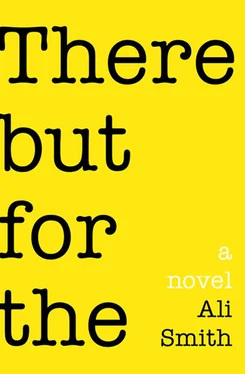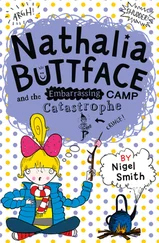It is a wise man not found anywhere on the world wide web, the Japanese girl told Anna.
It sounded like something you’d find on a slip of paper inside a fortune cookie. Anna nodded a thank you. Maybe the girl meant the dishevelled-looking man. He didn’t look that wise. He looked more homeless. The Japanese boy was sharing hot water he’d boiled on a small gleamingly clean Primus stove with him.
They gave me their umbrellas, the man told Anna. For when it rains. To keep. They’re retractable.
He put his hands in his pockets and brought out a compact umbrella in each hand.
Let it rain, he said.
The child knew the teenage girl over on the planks. She took Anna’s hand and pulled her over to the girl. The girl took one earphone out.
Oh yeah, the girl said, you’re Anna K. They’re so waiting for you. She’s in a state because you didn’t get him out of there this morning.
She put the earphone back in.
Anna mimed taking an earphone out of her own ear. The girl blinked. Then she did as Anna asked.
Thanks, Anna said. Will you do me a favour and tell your dad I’m sorry I couldn’t make it, and that I wish them both all the best?
You mean, me talk to them about something? the girl said.
I don’t mind how it’s conveyed, the actual message, Anna said.
The girl put the earphone back in her ear, got her phone out and started texting.
The child jumped up and down. She took Anna’s hand and pulled like a dog on a leash.
Which window? Anna asked the child again. Then she went over past the Japanese girl, who was filming the backs of the houses. She got as close to the house as she could get, right up against its back fence. She leaned over it, put her head through the head-sized gap between the rows of razor wire. She brought her arms carefully through.
She cupped her hands round her mouth and she shouted up between the coils of blade.
Miles. It’s me. I’m here.
There was once, and there was only once. Once was all there was, even though it was the year 2000 and it was the future and they were an advanced race wearing silver space suits (for that classic 60s “Apollo” look) and driving around in point-nosed cars exactly like the ones that featured twenty years before on TV shows like the one called Tomorrow’s World. Even so, even here, now, in the future, there was no getting away from that faraway nostalgic look in everybody’s eyes.
It was very annoying, the boy thought.
The boy was a paragon of modernity. He had the expensive shoes with the rocket-jet-propellers coming out of the heels that made it possible to fly to the record shop, to which, had it been twenty years ago, he’d have had to walk. He had his special injection packets lined up in the fridge-freezer for cancer and heart disease and flu and the common cold and pretty much everything that could go wrong with you. He had the extra limb that everybody could now have if they wanted (he’d chosen to have his new limb protrude from his forehead. This was so he could hold a book when he was tucked up in bed and turn its pages without untucking his hands, which were keeping warm under the covers — innocently under the covers. He was a good clean boy. Though he wasn’t a saint. And anyway now, obviously, all pubescent sexual desires and urges were taken care of with 25mg per night of Junior Calmit, which you could buy at any good chemist’s, and was made by Shake n’ Vac, who had done a manufacturing about-turn shortly after floors became self-cleaning).
In short, he had every mod con.
But he looked at his mother, who’d been married to his father for all those years, and all he saw in her eyes was a curly-haired eighteen-year-old called Albert, which wasn’t his father’s name, and who’d once, when she was sixteen and on holiday in the Isle of Man, whistled a tune every time he passed underneath her chalet window all that summer fortnight to let her know he was there and he was waiting for her.
He looked at his father, and all he saw in his eyes was a double image of a dark and deep and still pool in the river near where his father had grown up; it was back before the rivers were ruined, and in both those pools and both those eyes there was a silver fish the length of his father’s arm, and his father, aged twelve, who’d sat night after night waiting to catch that fish, was, God damn it, still sitting in the long grass at the side of that non-existent river right now in the far future.
He tried the eyes of some people he knew less well. He looked at their next-door neighbour. She had been hit by a bicycle when she was a young woman back in the ancient 1970s and her leg had been shattered, and even though she had a perfectly good new leg now all there was in her eyes was the fast flash of an afternoon of dancing at the wedding of her sister, when she’d been so fast and light on her originals, the feet she’d been born with, that it was as if they were winged.
He looked in the eyes of the neighbour who lived on the other side. This man’s eyes were terrifying because there was nothing in them but swastikas, and the images at the back of his eyes were, the boy decided, a place he himself would never choose to look again.
He couldn’t look in his grandmother’s eyes, because she had died and been buried without the necessary inbuilt computing system they’d launched in the year 1990 so that you could access the inner photo albums of the departed and leaf through them — just like, in the past, you’d have done if you’d gone to their house and a relative had handed you the album.
No one had yet solved the way of communicating with the dead. But when they did solve it, the boy thought, what would be the point anyway? All the dead would ever probably say, no matter what you asked them, would be, “Ah! once!”
The boy had known a girl who had died. She had been in the same year as him in the Young School. They’d sat together at the same Project Table; he had done Extinct Mammals (tigers and otters) and she had done The Old English Sycamore (the name, once, for a tree). Last year the girl had gone to bed one night and the next morning nobody had been able to wake her up.
It was a total mystery.
There weren’t many mysteries left.
Most of all the boy wanted to look into that girl Jennifer’s live eyes and see what was in them. There was no other girl’s eyes he wanted to look in, which was annoying and irrational. There would have been no point, obviously, in looking in her dead eyes, even if he could. They would just say, “ah, once,” etcetera.
But before she had died she had been young, like him, and not yet been onced by life.
Today the boy was taking his grandfather, who was a morose old man and didn’t get out much, up in a Pensionglide. They went up the public launcher on the side of the hill. Pensioners’ free airspace was from 10am till 12 noon, when less traffic used the skyway. There was a pretty good tailwind, and the Pensionglide went like a dream. His grandfather was in the back seat and the boy was in front, staring out at the blue of the sky and the stream of other pensioners going back and fore on the horizons of the turn of the century.
“Grandad,” the boy said, looking ahead into the eyes of the sky itself. “You are meant to be old and wise, and I need badly to talk to someone older and wiser than me, but I’m afraid to look into your eyes in case I see the same old story I keep seeing in everybody’s eyes.”
Then he realized the old man behind him was laughing. The old man was laughing so hard in the back of the Pensionglide that the little plane began to rock dangerously from side to side.
But he wasn’t laughing at what the boy had said, because he couldn’t hear what the boy had said; the boy’s words had been blown away in the wind (and anyway the old man wasn’t connected to his HearHelp).
Читать дальше












